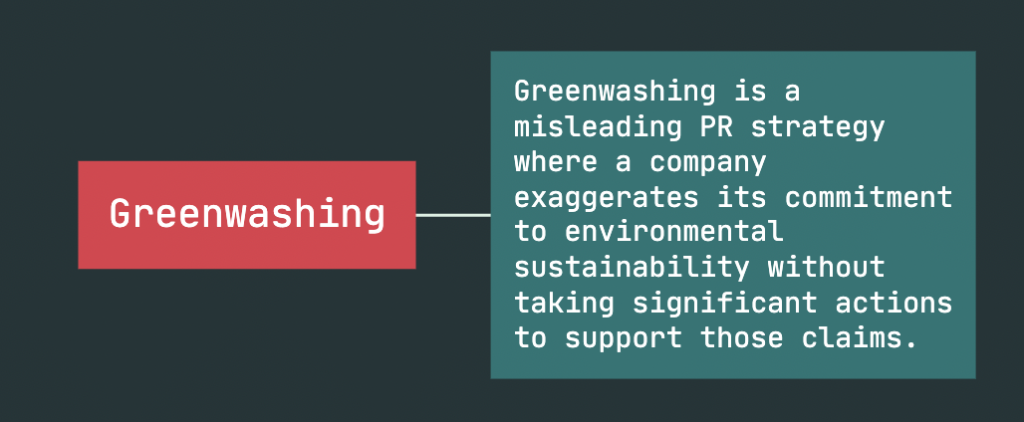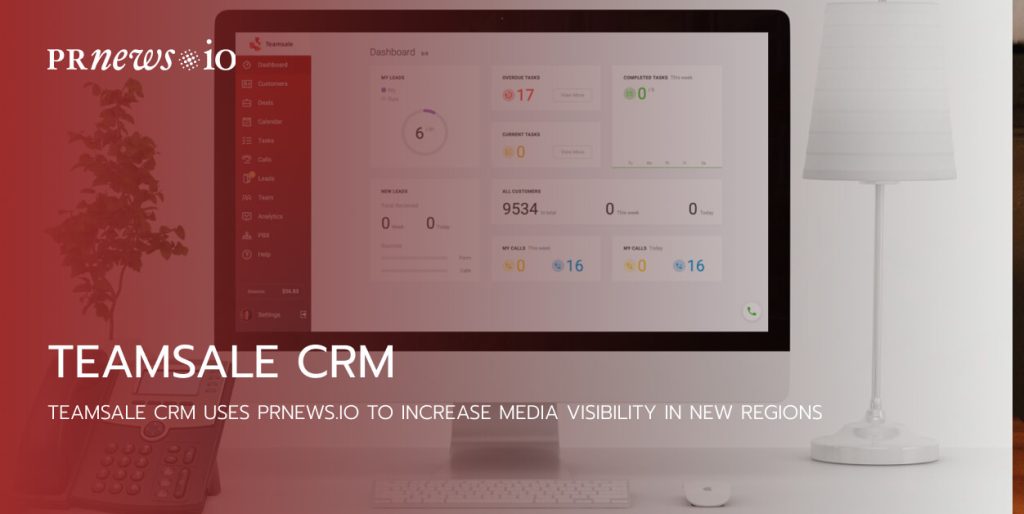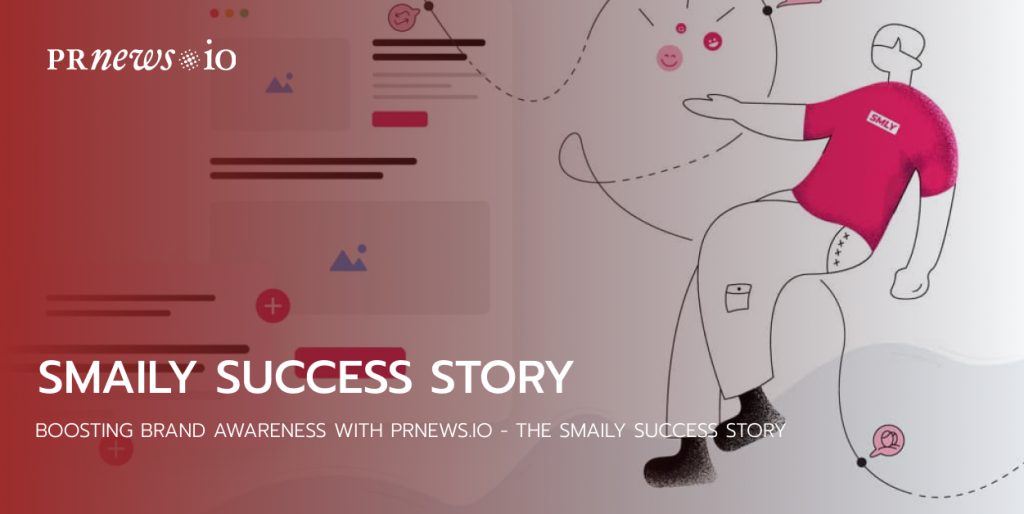In recent years, the term “greenwashing” has become increasingly prevalent in discussions about corporate responsibility and environmental sustainability. The global climate crisis is at the forefront of so many people’s minds, which is why so many brands are prioritizing and implementing eco-friendly practices. However, being blamed for greenwashing or implementing it incorrectly is quickly becoming a new crisis management concern across industries.
In this article, we delve into the concept of greenwashing and its examples, explore responsible ways to use it for public relations, address what to do if accused falsely, and provide alternative strategies for ethical communication.
What is Greenwashing?
Greenwashing refers to the deceptive practice of presenting a falsely positive image regarding a company’s environmental initiatives. While it’s crucial to condemn dishonest marketing tactics, there’s an opportunity for businesses to embrace sustainability and communicate their efforts transparently and genuinely.

Greenwashing is a serious concern in the corporate world, as it undermines trust and genuine sustainability efforts. It can take various forms, such as making exaggerated claims, using misleading imagery, or employing vague language to suggest environmental responsibility without substantial actions.
The Example of Greenwashing
One notable example of greenwashing involves Volkswagen (VW), a renowned automotive company. In 2015, it was revealed that VW had engaged in deceptive practices related to emissions from its diesel engines. The company had installed software in its vehicles designed to manipulate emissions tests. It provided false results that met regulatory standards during testing but allowed the vehicles to emit higher levels of pollutants under normal driving conditions.
VW had marketed its diesel cars as environmentally friendly, emphasizing their low emissions and fuel efficiency. The campaign, known as “Clean Diesel,” positioned these vehicles as an eco-friendly alternative, appealing to environmentally conscious consumers.

However, the scandal exposed the stark contrast between VW’s marketing claims and the actual environmental impact of their diesel cars. The revelation damaged the company’s reputation severely, resulted in substantial financial losses, and led to legal consequences.
How is Green PR Different From Greenwashing?
Greenwashing occurs when a company uses tricky marketing strategies to look sustainable when it’s really not.
Usually, a company that’s greenwashing:
- Uses unclear language (e.g. describing a product like “natural” or “made with organic ingredients”)
- Avoids transparency around their supply chain
- Concentrates on one small sustainable change to distract attention from other negative practices (like calling out their use of organic cotton even though the majority of their products use polyester).
As the climate crisis goes on, audiences are getting more and more sophisticated on true sustainability and greenwashing. They know what to look for and will stop supporting brands that engage in greenwashing.
Instead, green ethical PR is an authentic, value-based PR strategy, where you have to share real eco-friendly activities and present sustainable features of your product. These activities will help you avoid accusations of greenwashing and build a loyal, eco-friendly audience.
Why Is Green PR Important No Matter of Your Niche?
Because sustainable products are no longer niche. Request for green products isn’t coming from a niche sector of young, affluent climate activists. It’s coming from the mainstream audience, and that’s why it fits every niche.
So how will it help you?
Consumers want to buy products and support brands that align with their values on the climate crisis.
These days people stop buying products based on first impressions without checking the company beforehand. They want to support companies that align with their values and will do the research necessary to make sure their choices line up.
PR experts can advantage of it and grab their attention by focusing on green PR and converting the brand’s sustainability initiatives into the biggest publications.
Finally, it’s all about creating compelling, engaging content that shows how environmental protection and sustainability are at the top of the company’s priorities. As a PR pro, you have to focus on the positive impacts of the brand’s initiatives, both on a global and personal level of their top management and employees.
Of course, some people don’t care much about using and purchasing sustainable products. But you will have far more success with a PR strategy that is focused on the people who do care. And later, that indifferent part of the audience will join the “green team” eventually.
Your Client Will Reach New Audiences
Also, some people who are truthfully committed to an eco-friendly lifestyle may stop supporting their tried and true brands if their actions remain below. Your green PR efforts could convert new customers who may have never made the switch but are looking for eco-friendly brands.
You can also add environmentally-conscious consumers to your client’s target audience once you start to implement green PR practices. Say you represent a cosmetic brand targeting people 18-30 who want organic, minimalist skincare. With green PR, you can work with this group to capture the attention of eco-conscious audiences regardless of age demographic, or desired look.
It Improves Your Client’s Reputation
Adding “environmentally friendly” to your client’s list of attributes is huge in creating a positive brand image. Both existing and potential customers will appreciate such initiatives and will recognize the good deeds your brand is doing for the ecology.
When green PR is done effectively, you can earn your client’s loyalty from publications and organizations focused on healing the planet. If sustainability initiatives are rare in your niche, you’ll have a great opportunity to establish your status as an innovator in the industry or niche. It will help you maintain the spotlight far beyond the next news cycle.

Leveraging Greenwashing for Ethical PR
Using green marketing to strengthen your brand involves communicating your dedication to environmental sustainability and demonstrating how your products or services contribute to a greener, more sustainable world.
And remember, that all businesses have a responsibility to the environment. These tips on how to communicate it properly will help you create a powerful PR strategy and succeed:
Highlight Genuine Achievements
If your company is committed to sustainability, don’t stop showcasing your accomplishments. Clearly communicate the steps you’ve taken, emphasizing measurable results.
Collaborate with Authentic Certifications
Partner with recognized environmental certifications and labels to validate your efforts. Third-party endorsements add credibility and demonstrate a commitment to accountability.
Engage in Continuous Improvement
Demonstrate an ongoing commitment to improvement. Acknowledge areas where your company can improve and outline plans for future sustainability goals. This shows a dedication to real progress rather than just superficial changes.
Also, you can avoid being not so straightforward, you can leverage the alternative strategies:
Social Impact Communication
Instead of focusing solely on environmental initiatives, broaden your PR efforts to encompass social responsibility. Highlight contributions to local communities, ethical labor practices, and diversity and inclusion efforts.
Innovation and Research
Showcase your commitment to sustainability through innovation and research. Highlight investments in eco-friendly technologies or participation in industry-wide initiatives that promote positive change.
Collaborative Partnerships
Partner with other organizations, NGOs, or governmental bodies to address environmental challenges collectively. This collaborative approach not only strengthens your sustainability efforts but also demonstrates a commitment to wider social and environmental causes.
Responding to False Accusations
If it so happens that your company is accused of greenwashing, take a breath and build your strategy for responding to it. Here are the steps:
1. Assess the Accusations:
Investigate the accusations carefully. Understand the specific claims and gather evidence to support your case. Be ready to address each point transparently.
2. Communicate Transparently:
If the accusations are baseless, communicate your side of the story with honesty and transparency. Provide evidence and data to counter false claims and reiterate your commitment to genuine sustainability.
3. Learn and Improve:
Use the experience as an opportunity for improvement. If there are aspects of your sustainability communication that led to misunderstandings, take steps to enhance clarity and transparency in the future.
Conclusion
In the era of heightened environmental awareness, companies must navigate the delicate balance between genuine sustainability and accusations of greenwashing. By adopting transparent communication, aligning actions with values, and embracing continuous improvement, businesses can build trust and credibility. When faced with false accusations, respond with integrity and use the experience as an opportunity for growth. Remember, ethical PR is not just about avoiding greenwashing but actively contributing to a better, more sustainable future.
Is your business in need of a PR makeover?
- Benefit from media coverage assistance.
- Witness a refined branding approach.
- Watch as your recognition soars.





